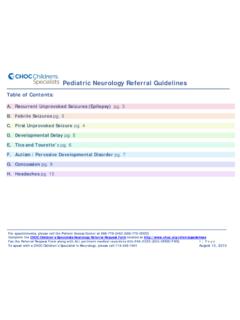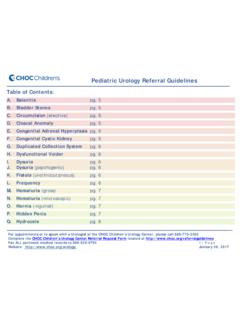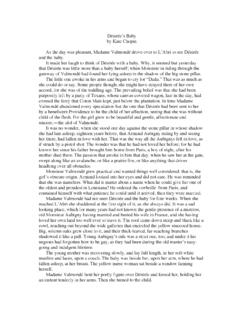Transcription of Sleep Hygiene for Teens - CHOC Children's
1 Sleep Hygiene for TeensTeens typically need about 8-10 hours of Sleep per night, but it is common for the average teen to get 7 hours or less per night. What are some factors that prevent Teens from getting enough Sleep ? Shifting of the biological clock. After puberty, a teen s internal clock shifts about 2 hours. For example, if a teen fell asleep by 9 pm before, he/she typically is not tired until after 11 pm. This also means that he/she naturally will want to Sleep 2 hours later the following morning. Early school start times. Most school districts start classes as early as 7 , which means Teens have to get up as early as 5 to get ready and make it to school in a timely manner. Having a busy social life. Most Teens partake in afterschool activities such as clubs, sports, part-time jobs, or household chores, on top of the homework that s assigned daily and must be completed each evening.
2 Socializing also continues through phone and computer use, which can keep them up even later. What is aff ected by not getting enough Sleep ? Mood. Not getting enough Sleep can cause Teens to be irritable and moody all day. Controlling their moods can be an issue, and they can fi nd themselves frustrated or upset more easily. Behavior. Teens who are not getting enough Sleep are more prone to risk-taking behaviors such as drinking alcohol and driving recklessly. Thinking. Sleep deprivation can result in attention problems, memory problems, lead to bad decision-making, slow down reaction time and stunt creativity. These are all important for academic success. Academic performance. Teens who are Sleep deprived are more likely to do poorly in school, fall asleep during class, have multiple school absences or be consistently tardy. Athletic performance. Sleep deprived Teens are more likely to perform poorly in after-school sports due to slower reaction times.
3 Driving. Teens are the most prone to fall asleep while behind the wheel. This can be highly dangerous, especially combined with other negative eff ects such as slower reaction times and being easily can I do? Keep track of Sleep patterns and schedules. Maintain a regular Sleep schedule. Teens should be going to bed and waking up at around the same time every day, including non-school nights. Try to keep the diff erence in Sleep and wake times within one hour. Be consistent on weekends. Although Teens can stay up a little longer, they should not Sleep in to catch up on Sleep they missed during the week. It will make it harder to get back on track for their regular schedule. Create a Sleep -friendly physical environment. The bedroom should be comfortable, cool, quiet, and dark. A bedroom that is warmer than 75 degrees can make it harder to fall and stay asleep. The bed should only be used for sleeping.
4 Try not to do homework, read a book, or listen to music in bed. Keep a consistent bedtime routine. Try to wind down by doing less stimulating activities such as reading or listening to calm music. Do not use this time to watch television, cram in more studying, use the computer, talk on the phone, or exercise. Here are some additional important tips:Try to: Incorporate exercise into your daily routine. It may help you fall asleep more easily and Sleep more deeply. Take a break and go outside for some time every day, especially in the morning. Getting sun exposure helps your body keep its internal clock on track. Eat meals regularly, and avoid going to bed on an empty stomach. However, do not eat a full meal an hour before bed, and try to opt for a light snack instead. Avoid: Caff eine. Avoid consuming caff eine ( soda, coff ee, tea, energy drinks or chocolate) in the late afternoon or evening.
5 Alcohol. Alcohol is not only bad for your overall health, but it also disrupts Sleep . You may have night awakenings. Smoking. Smoking also disrupts Sleep . It is best for your health not to smoke at all, but try to not smoke for at least an hour before bedtime if you do. Sleeping pills. Do not use sleeping pills or other over-the-counter Sleep aids. They can potentially be dangerous and you may depend on them once your Sleep problems return.











